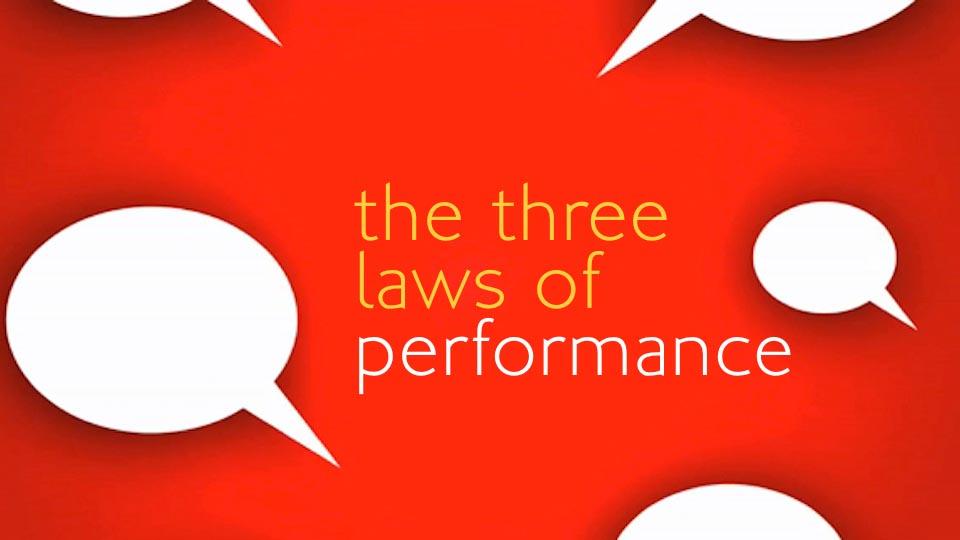Three Laws of Performance
By: Steve Zaffron and Dave Logan

LISTEN
READ
Everyone thinks of changing the world but no one thinks of changing himself.
The words of Leo Tolstoy still echo loudly as we live in the world that requires so much change but so little of it seems to happen.
In the bestselling book The Three Laws of performance Zafron and Logan explored just how we can create change in situations which seems not only unlikely but impossible.
Warren Bennis said that this book may be one of the most important written in many years and I agree. But here is a prediction and challenge:
Your mindset right now as you are sitting there on chair or in your car or wherever you are will completely determine what you will get of these ideas. It might even be the difference between your world being transformed or leading the same old life that you’ve always had.
I will ask you for just this once to check whatever thoughts you might have about what you hear in the next ten minutes at the door and truly try on these ideas for size. If you do you will literally rewrite your future. Here we go.
Law #1: How people perform correlates to how situations occur to them.
Consider this - when you do something, it always makes complete sense to you. On the other hand, you might often find yourself thinking “why the hell are they doing it like that, it doesn’t make any sense!”
Here is an example that we will use throughout the episode.
Consider that your company CEO just got shown the door from the board of directors. In her place comes a young hot shot from a smaller but innovative company. Bill, your co-worker, somebody has been in the trenches with that CEO and firmly believed in her vision, thinks that this is a dramatic step backwards for your company and it might even doom it to failure.
On the other hand, you 10 years younger than Bill, looks at this new CEO and sees a bright future filled with new opportunities.
These two interpretations are how the situation occurred to you and Bill. Consider how your performance under this new leader will differ depending upon your interpretations of the facts. And all of this occurs before the new CEO even speaks a word to you. If you think of this for a second, you start to see something profound.
Both interpretations of the facts are valid interpretations, right?
But these interpretations are colored with so many things - our upbringing, our social status, our gender, our culture and a multitude of other factors. The problem is we don’t treat them as interpretations of the facts, we treat them as the facts themselves. For Bill, that the company is doomed into failure is not an interpretation of the facts, that’s just the way it is.
As soon as we have decided that, we have written our future in such a way that we will do anything we can to make sure it comes true. The authors state a corollary to this law - that the leader has a say and should give others a say in how situations occur.
This is a tough one to swallow as it puts complete responsibility of how a situation occurs to others directly on your shoulders.
If you accept this, then you now have the responsibility not only for your actions but how other people interpret your actions. This is a large responsibility to take on but one that can produce results beyond what you can imagine today.
Ask yourself these questions as you wrestle with the idea. How can I interact with others so that situations occur more empowering to them? What processes, dialogue, or meetings can I arrange so that people feel like that they are co-author of a new future not merely recipients of others decisions?
Law #2: How a situation occurs, arises in language.
Lets go back to our example. The facts are that CEO got fired and somebody else took their place. The thing that brought your interpretation of the facts to life was language. Consider the example of Helen Keller, who before she learned how to use sign language at the age of 8, knew only knew life with darkness and stillness.
She said that “my life was without past or future.” As the authors say she saw language for what it is - a force that makes us human, that gives us a past and a future, allows us to dream, to plan, to set and realise goals. Keller made this dramatic shift when she was only 8 years old, an age old enough to remember forever.
For rest the of us language is just something that has been always with us, so we don’t pay attention to its presence and we don’t realise the true power our words and conversations have in the world, until now.
A lot of these conversations that we have with ourselves or others the authors call is a racket. There are 4 elements to a racket.
First, there is a persistent complaint. The constant complaint in this situation might be “he is not leading the way the old CEO did.” Remember Bill will be looking for all the ways the new CEO differed from the old one so this shouldn’t be surprising.
The second element is the fixed way of behaving, which for Bill might be resigned, sad, isolated and detached.
Third there is a payoff. The payoff for Bill in this situation might be that he gets to be right and gets to make that new hot shot CEO wrong. In fact he probably will have a file folder for all the stupid mistakes he made since he took over. Have you ever felt like proving somebody wrong? It feels good right? Well that’s the payoff.
The last element of the racket is the cost. The cost in this situation should be obvious. Bill’s effectiveness and drive will plummet and he will probably drag down others in the department in the process. Overall the effect is a disastrous negative for Bill. He will probably get fired and your company will suffer for as long as people like Bill are kept around.
Do you see any constant complaints in your life or in your organisation?
The corollary to this law states that the leaders master the conversational environment. This means as a leader you realise anything and everything that happens in your company begins as a conversation. Mastering these conversations so that they do not focus on persistent complaints but instead help you to create a new future brings us to law number 3.
Law #3: Future based language that transforms how situations occur to people
Consider this. People - including you - live into future they see coming at them.
For Bill future is bleak and hopeless, for you the future is bright and full of opportunities. Bill’s future is just as real to him as yours is to you. The authors call this the default future and we all have one. We live into that default future every single day of our lives until we change that default future and create a new one.
How we do that is through future based language. This doesn’t really modify the default future; it completely and wholly replaces it.
This type of language is responsible for turning points in history like Churchill’s fight them on the beaches speech that replaces the default future of death and destruction and Martin Luther King’s, I have a dream speech that displace the default future of racial segregation.
Before we create a new future we have to get rid of the old one that we have created. For instance you and Bill would have to give up the futures you created when you heard that there was a new Sheriff in town.
There are 3 dimensions to doing something that we call blanking the canvas.
First we need to see what binds and constrains us isn’t the facts, it’s language. In particular, this descriptive language merely states interpretation as facts. For Bill it is pretty clear he is constrained by this language.
The second step is to articulate the default future and ask - “do we really want this as our future?” For Bill this would be a powerful question to ask.
Lastly to create a blank space we need to take on the most powerful and difficult subject - completing issues from the past. This means that you clean up any messes that your racket has created.
For Bill it might need reaching out to the members on his team and addressing the reason for his aloof and detached behaviour and take whatever action necessary to give up the racket.
Now you are ready to create a new future.
There are 3 principles that exist in generating a new future: (1) they inspire action, (2) they speak to everyone in the process - and this means your entire company - and (3) they exist in the moment speaking.
Like we talked about earlier, everything exists in language and conversations. Here is the question you need to ask if you going to create a future that inspires action. What conversations in the organisation are missing, that if created and implemented will lead people with new pathways for action?
As you are starting to have these conversations your new future will start to generate itself. As you start to pick up steam you will encounter people like Bill who are still resigned to a default future of failure and it seems like nothing you say will make a difference to him. So instead of trying to keep inspiring him ask him this question, what is your counter proposal?
Your job as a leader is to keep on working until the entire organisation says “this speaks to me” and they commit to this new future.
Conclusion
Remember, how people perform correlates to how situations occur to them and you are responsible for that. How the situation occurs arises in the language and leaders master the conversation environment. And lastly, future based language transforms how situations occur to people.

© Copyright 2021. Central Command Ltd. All rights reserved.